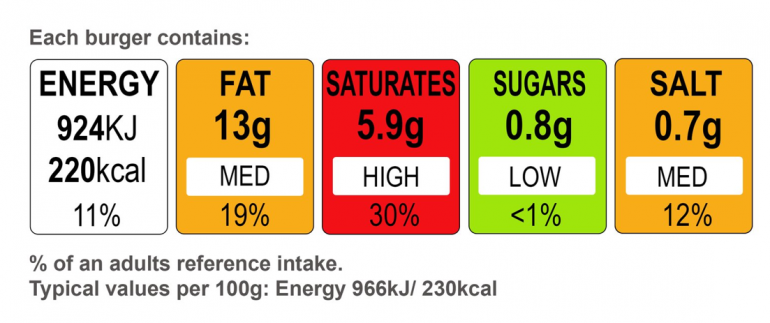Obesity has been on the rise in the US, UK and Canada for some time now and is strongly linked to reductions in life expectancy. This is likely to have a significant effect on future health and longevity, but with growing appreciation for the impact of nutrition on health, there is hope that we may be able to turn this tide.
My prediction is that nutrition and diet will be recognized and embraced as one of the major drivers of future health and longevity.
Increased awareness of what’s actually in our food
Awareness around what’s in our food is increasing; recommended daily intakes for food contents such as fat, saturated fat, sugars and salt are now well publicized and manufacturers are being pressured to disclose to us what actually makes up our food. Global fast-food chains such as McDonalds now disclose the calorie content of their menu items, and in the UK, they have even developed a traffic light system to allow consumers to easily identify warning signs for items in food stores. Long gone are the days when Nutella could be advertised as a healthy breakfast option!

In response, supermarkets’ “free-from” aisles are growing in size as consumers search for foods that are free from certain ingredients, and the global functional food ingredients market is causing manufacturers to innovate to match the high-growth demand of individuals looking for food promoting wider health benefits than just nutrition. A common food rule from the world’s longest-living people suggests cutting out any food products that list sugar among its first five ingredients, especially added sugars. As you take a closer look at your ingredient labels, it’ll be easier to identify which foods may fit the “not-so-great” category, and I hope also which foods can assist with living a longer life.
Food delivery services in a digital age
As our awareness around ingredients and healthy eating is growing, so is our need for convenience. The words “digital age” have been permanently ingrained in our brains lately, which is where our smartphones and our endless need for the world at our fingertips comes into effect. 2020 was a year of significant growth for grocery and food delivery apps. Uber Eats became the norm. The amount of times I thought “wow, how many bottles of wine can I get without having to go to the local store” was embarrassing. It’s a bit ironic that I’d be reaching for that same wine bottle I’d just purchased through Uber Eats every time I was approached with the question at family gatherings “so, how often are you cooking now?” All jokes aside, usage of food delivery apps is expected to increase well into the future. In the U.S., studies suggest that frequent use of digital food delivery apps is overwhelming. In a study by Zion et al, 40% of people surveyed had used a multi-restaurant food delivery app in the past 90 days. With fast-food heavily linked to adverse health effects, this is of particular concern when 63% of food delivery app users are amongst those between 19-29 years of age. It is well-known that obesity is linked to lower life expectancy, and it has been observed that overall happiness decreases among those with excess weight. Generally speaking, we are sacrificing our health, life expectancy, and future quality of life for the convenience of food delivery.
The psychology of eating
Eating is a rewarding behaviour. Most of us choose what we eat based on our emotions; we eat when we’re stressed, distracted, trying to cope, forget, or reward ourselves (that chocolate cake I adore certainly fits into the “reward” category). We eat when we’re watching our favorite shows or when we’re scarfing something down before our kid’s soccer practice because we must not be late, or we may frustrate the coach again. We’re not fully present and as a result, we’re not completely aware of each bite we take. Unfortunately, food won’t fully solve our problems. So, instead we can practice mindful eating. When our awareness increases as we are eating, we can slow down and enjoy the flavors, we can stop eating once we are satisfied instead of full, and we can avoid overeating. Our focus shifts and we learn to listen to what our bodies are trying to tell us. When we are more in-tune with our bodies, we’re focused on how certain foods make us feel. As a result, we can make better food choices, we feel better about our lifestyle, and this opens the door for a happier, most-well version of ourselves as we look to live a longer life.
Can we have it all?
Until the convenience of food delivery apps can meet our demand for “better for you” foods, it’s up to us to maintain a healthy balanced lifestyle. Did you know that genetics only account for a variation of 16% in overall life expectancy? I’ve gone most of my life thinking that if my grandma can make it to her 85th birthday, then I can too! This is true to a degree, but it seems our lifestyle choices and habits will greatly affect how long we get to experience our physical life here on Earth as we know it. And yes, this includes what we also choose to put on our grocery list. But, how can we make time for these choices when we’re always so busy? My first step is this: acknowledging that conveniently delivered bottles of wine aren’t so worth it, after all.
My prediction is this rising awareness will place nutrition and diet firmly in the forefront of future discussions on public health and longevity.
Meet the team
Club Vita could not deliver the vast array of statistical insights without our gifted team.




